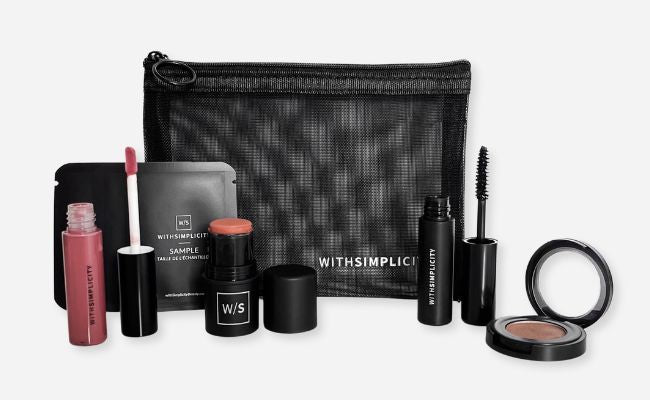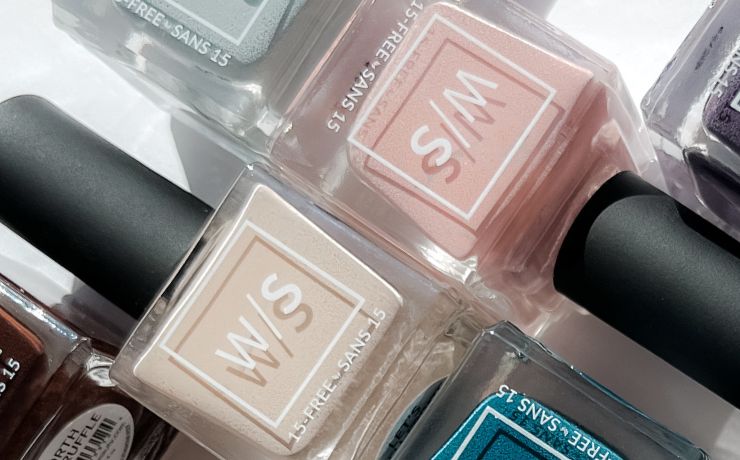withSimplicity | May 3, 2024
How to transform your Natural Skincare & Welness Routines with Essential Oils

Essential oils are gaining increasing attention as the natural skin care industry expands. Aside from their mood-boosting benefits, they possess the potential to enhance your journey toward a healthy, glowing complexion.
Let's learn how to properly and safely include essential oils in skin care and how oils can be used in other aspects of your wellness journey!
What Are Essential Oils?
Essential oils are potent, volatile plant extracts that retain the natural essence of their sources. They’re made by pressing various plant parts — such as leaves, flowers, bark or fruit — to capture the nutrients and fragrance.
Several pounds of plant parts may be necessary to fill a single bottle. Popular oils include peppermint, sandalwood and lavender.
What’s the Difference Between Extracts and Essential Oils?
Extracts and essential oils are popular terms in the natural skin care industry. While both provide benefits, they serve different purposes.
Extraction Process
Essential oils are extracted using steam distillation and hydrodistillation methods. Flowers, roots or leaves are squeezed inside a steam chamber. The extracted substances are collected and cooled in a condenser, which creates water and separates the oil. This process releases the plant’s oils in their most potent form, maintaining its health benefits.
Extracts are made by steeping a plant or flower in a solvent to isolate its natural components, like soaking tea in hot water. They can also be obtained from essential oils by mixing them with glycerol, propylene glycol or ethyl alcohol.
Aroma
The aromatic characteristics of both products are distinctly different. Essential oils provide more scent due to their highly concentrated properties, which is what makes them a cornerstone of aromatherapy. Consequently, extracts are less aromatic because the extraction process waters them down.
Versatility
Essential oils are commonly used in aromatherapy and natural skin care. Their concentrated smells can also fragrance many cleaning solutions. Consequently, since extracts have milder concentrations, they are more gentle on your outer barrier, making them ideal for sensitive skin.
The Different Uses of Essential Oils
There are various ways you can incorporate essential oils into your daily life:
Aromatherapy
If you use a humidifier, you could use essential oils with it. Add a few drops to the water tank and wait for it to fill your home with a calming scent. You can also inhale essential oils if you’re feeling down.
Clinical studies have shown they can help alleviate mental fatigue, stress, sleep problems and memory issues. The next time you feel down, smell eucalyptus, peppermint or lavender to promote better cognitive performance.
Self-Care
You can also add essential oils to your bathwater. However, you’ll need to dilute it with jojoba or coconut oil. Avoid adding pure essential oils to your bathwater — especially if you have sensitive skin — because they aren’t water-soluble and may cause irritation.
Certain essential oils can also help with congestion. For instance, eucalyptus oil can refresh nasal passages, allowing you to breathe more comfortably. Add a few drops of your favorite essential oil to a bowl filled with steaming water. Then, hold your face over the bowl while covering your head with a towel to prevent the vapor from escaping..
Skin Care
Our favorite use!
Despite being used for around 6,000 years, a French scientist only discovered the skin-boosting properties of essential oils in the 1920s. Some can assist in wound and burn healing, while others can help treat acne and brighten the skin.
Essential oils must be mixed with a carrier oil to reduce the risk of irritation. Carrier oils are ingredients that help make essential oils safer for your skin. They also have their own therapeutic benefits, including reducing inflammation, retaining moisture and fighting oxidative stress.
The Best Essential Oil Skin Care for Every Skin Type
Now to get more skincare specific, let's talk about which essential oils are our favorites to use in our natural skincare formulations and how they each target specific skin types / concerns.
Dry Skin
You have this skin type if your skin looks and feels rough, flaky, and scaly. It may also be seasonal, appearing during the winter or warmer months. This is commonly remedied with moisturizers and creams to prevent moisture loss, but some essential oils could boost hydration.
Lavender is a multipurpose oil that can help retain moisture in the skin. It also has inflammatory properties that help eliminate tightness without making you look greasy. Sandalwood and chamomile have anti-inflammatory properties that can help reduce redness while promoting moisture retention. Avoid using chamomile if you have ragweed allergies, as these may cause unwanted skin reactions.
Sensitive Skin
Sensitive skin is more prone to inflammation, irritation and issues like eczema. Its symptoms include itching, burning and rashes. Individuals with this skin type often can’t use conventional products with fragrances or added chemicals. If you have sensitive skin, avoid highly acidic oils like lemon.
Chamomile essential oil provides comfort to irritated skin and improves the appearance of rashes. Lavender, frankincense and sandalwood are also beneficial. When used skincare, we dilute them in carrier oils like grapeseed oil, argan oil and sunflower oil are excellent carrier oils, as they contain gentle nutrients that benefit your sensitive skin.
Luckily, if you have super sensitive skin, all of our natural skincare products are a great choice!
Oily Skin
An oily skin type experiences excessive oil on the skin’s surface. Environmental factors such as heat and humidity can exacerbate oil production. You have oily skin if your face is shiny and greasy later in the day.
You may think applying oil to oily skin is ineffective, but that’s not the case. Some products can help control excess sebum production.
Frankincense essential oil contains rejuvenating properties that help reduce oiliness, leaving your skin feeling fresh. It also includes calming benefits to fight inflammation. Rosemary oil also helps regulate sebum production, but mix it with a carrier oil to reduce the risk of irritation and acne breakouts.
Acne-Prone Skin
You have acne-prone skin if you have recurring pimples. Lifestyle changes and investing in products that help reduce oil production without drying the skin are essential.
Tea tree oil is one of this skin type's most common essential oils because of its anti-inflammatory and anti-bacterial properties. It helps reduce active pimples and prevent future breakouts. Applying a product that contains 5% tea tree oil can help mild to moderate acne .Lemon, rosemary and frankincense essential oils can also help alleviate acne.
Combination Skin
You can tell if you have combination skin if your T-zone — forehead, nose and chin — is oilier than the rest of your face. Lavender helps control oil production and soothes skin, making it ideal for oily and dry patches. Geranium essential oil contains antibacterial benefits that can help prevent acne and reduce inflammation. Choose jojoba oil as your carrier, as it moisturizes skin without clogging pores.
Mature Skin
Having mature skin is a natural part of the aging process. Dark spots, wrinkles and fine lines are normal occurrences. While there’s no way to reverse aging, there are ways to help reduce the appearance of aging signs.
Rosemary essential oil is an excellent choice for its antioxidant properties, helping defend the skin from free radicals. Lemon and clary sage also have anti-aging properties that help brighten your complexion. Remember to dilute them with carrier oils with moisturizing properties, which are vital for any wrinkle-fighting skin care routine.
Are Some Essential Oil Bad on Skin?
Just because essential oils are naturally produced doesn’t mean they’re entirely safe. Some essential oils can trigger unwanted reactions and even chemical burns. For instance, citrus oils can cause photosensitivity due to the furanocoumarin compounds that increase the skin’s UV sensitivity.
While effective in treating hyperpigmentation, citrus oils can irritate the skin if not used properly. Reap the glow-boosting benefits without compromising your skin with these tips:
- Always Dilute: Citrus oils contain astringent properties that activate under directsunlight, which may cause chemical burns when applied in their potent form. We always add carrier oils such as olive oil or jojoba oil to reduce the concentration of the oil so it's safe to use outside.
- Use Sunscreen: Apply a generous layer of sunscreen over any citrus-infused skin careproduct before going outdoors. If you have sensitive skin, use diluted citrus oil atnighttime.










Leave a comment
This site is protected by hCaptcha and the hCaptcha Privacy Policy and Terms of Service apply.